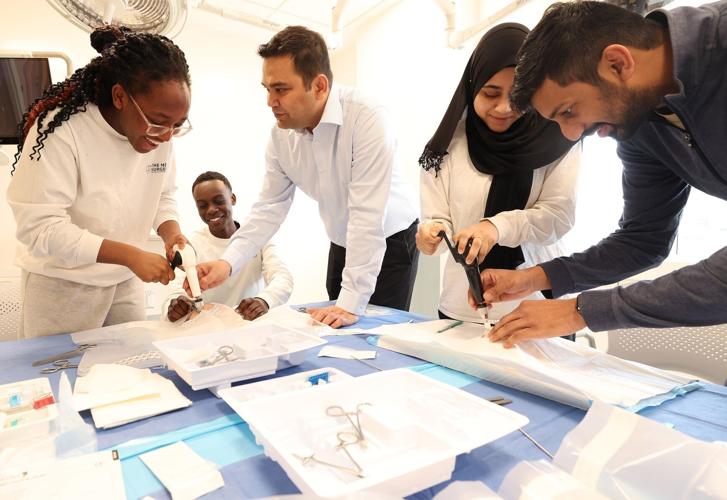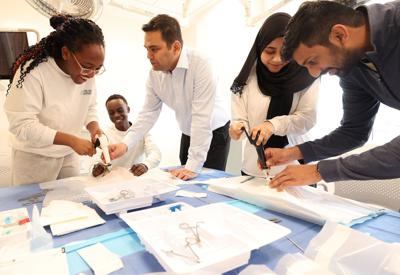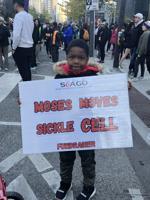Instead of spending a typical Saturday relaxing or hanging out with friends, a group of high school students spent the afternoon immersed in hands-on learning at one of Toronto’s top medical facilities.Â
They were part of The Next Surgeon, a program designed to connect young people from marginalized communities with medical professionals to help them explore the field. Created by the º£½ÇÉçÇø¹ÙÍøCommunity Housing Corporation, the program brings together residents in grades 10 to 12 with medical students, residents, and staff physicians who volunteer to guide students through workshops and be their mentors throughout the program and beyond.
Stacy Golding, a community services coordinator with º£½ÇÉçÇø¹ÙÍøCommunity Housing, is the lead staff member behind the program. She said the initiative creates a space for young people to network and gain valuable skills — particularly when many lack the resources to do so on their own.

A student stitches a simulated section of bowel for a bowel anastomosis. during a workshop held at UHN’s Michener Institute of Education.Â
Steve Russell / º£½ÇÉçÇø¹ÙÍøStarGolding said the medical field “has always been a white space.” While data on racialized physicians in Canada is limited, the  reports that Black people account for 4.7 per cent of the province’s population, but just 2.3 per cent of its physicians. All of the participants and volunteers in The Next Surgeon workshop on this day were racialized.
Now in its third year, the program will have graduated around 80 students by the end of the current session in April. “If I can get 50 (alumni) into life or health sciences, I think we’ve made it,” Golding said. “I want our kids in medical school. I want our kids to be doctors.”

 On March 1, participants began by meeting the team of doctors and medical students who would be mentoring them though a series of hands-on surgical simulations.
Steve Russell / º£½ÇÉçÇø¹ÙÍøStarThe program is hosted in partnership with , the office of access and outreach at U of T’s Ìý²¹²Ô»åÌý, a mentorship program for under-represented medical students interested in specializing in surgery.
Throughout the four-month program, participants engage with volunteers, attending weekend sessions that include simulations on emergency and surgical techniques, first aid training and more. During recent sessions held in the Temerty Advanced Surgical Education and Simulation Centre at UHN’s Michener Institute of Education, they learned techniques like skin suturing, hand tying and laparoscopic surgery, for example.

A suture practice pad set up for use by the Next Surgeon’s participants during a surgical simulation workshop facilitated by UpSurge on March 1.
Steve Russell º£½ÇÉçÇø¹ÙÍøStarBy exposing young º£½ÇÉçÇø¹ÙÍøCommunity Housing residents to the medical field and the possible pathways to it early on, The Next Surgeon aims to not only diversify the medical field, but benefit patients in the long run too. “We know at the end of the day, (the doctors are) going to end up going back and serving” their communities, Dr. Adom Bondzi-Simpson, U of T general surgery resident, co-founder of UpSurge and Next Surgeon volunteer, explained.

A participant is assisted in stitching a simulated section of bowel for a bowel anastomosis.Â
Steve Russell º£½ÇÉçÇø¹ÙÍøStarWhen it comes to deciding on applying to medial school or choosing a specialty, “being able to be face-to-face with people that look like you — have been through this in the past and have had their own challenges — and getting to ask questions in a more comfortable, safe setting is incredibly important,” said Tiffany Ni, a volunteer at the hand tying station in the simulation centre workshop and first-year diagnostic radiology resident. “Having access to that in this environment is, I think, a big deal.”
Emad Sagaaf, a participant and grade 12 student, validated that sentiment, adding that he appreciated getting a taste of what medical school and being a physician is actually like, and getting to meet all of the doctors, residents and students that have come in over the course of the program.

Caleb Bwamiki, one of the Next Surgeon’s participants said his biggest takeaway has been understanding that everyone he meets and every experience he has is worth learning from.
Steve Russell º£½ÇÉçÇø¹ÙÍøStar“If they can do it, I can do it,” he said. The volunteers have been a “big inspiration on what to do in the future.”
Sagaaf, who lives in St. Jamestown, wants to study at UofT and become a surgeon. “I want to bring good to the community,” he said, adding that violence is not uncommon for kids growing up in the area to witness. “It’s disheartening and makes you feel bad … I want to be a role model for the other kids who live in the community.”
Correction - March 31, 2025
This article and a photo caption were edited from a previous version. The weekend sessions are held at the Temerty Advanced Surgical Education and Simulation Centre at UHN’s Michener Institute of Education, not at U of T’s Temerty faculty of Medicine. Â

































To join the conversation set a first and last name in your user profile.
Sign in or register for free to join the Conversation